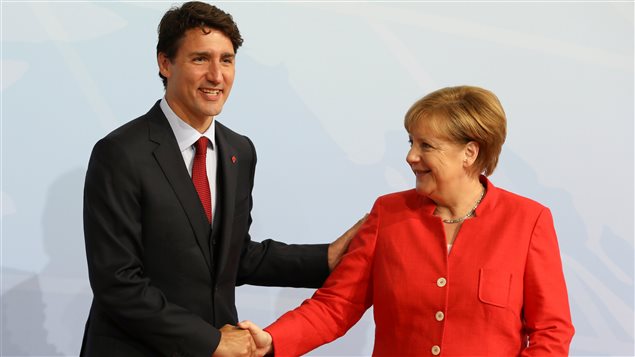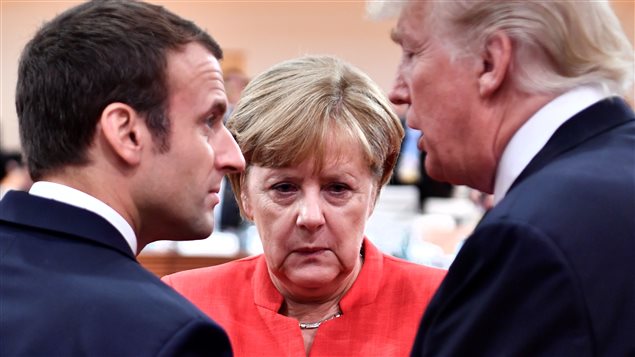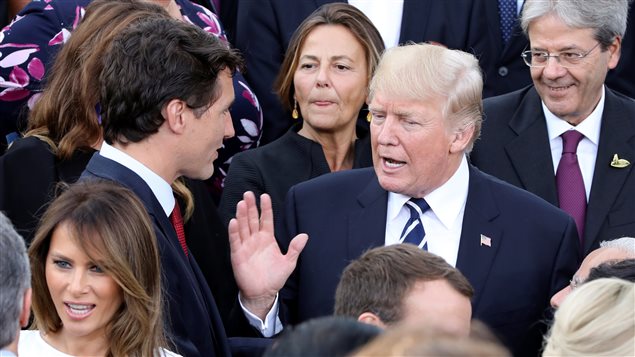As world leaders meet at the two-day G20 summit in Hamburg, Germany Prime Minister Justin Trudeau is expected to play a crucial role in bridging differences between U.S. President Donald Trump and his European allies, especially German Chancellor Angela Merkel, experts say.
While much of the media attention has been focused on Trump’s meeting with Russian President Vladimir Putin, the summit’s first working day ended Friday with no sign of a breakthrough in the negotiations on the meeting’s final statement.
Merkel, who is chairing the meeting, said talks about the wording to be included in the G20’s final statement are proving to be “very difficult.”
Delicate balancing act

The summit’s official negotiators, or so-called sherpas, still face a lot of work to forge an agreement on a G20 final declaration before the meeting ends on Saturday and the leaders head home, Merkel said.
But Trudeau, who on the one hand needs Europe’s support for the Comprehensive Economic Trade Agreement, and on the other hand depends on the U.S. for much of Canada’s trade and security, will have to perform a difficult diplomatic tightrope act to try to bridge that gap, said Tristen Naylor, a former Canadian diplomat.
“It’s certainly a delicate balancing act and it’s going to require nothing but best diplomacy to pull it off,” said Naylor who teaches Diplomatic Studies at Oxford University and is the deputy director of the G20 Research Group, in London.
“I think by sticking to the principles that are at the core of Canada-U.S. relationship, and indeed they are at the centre of relationship between Canada and Europe, he’ll be able to bridge the divide that presently exists between the German hosts and the United States under Donald Trump.”
(click to listen to the interview with Tristen Naylor)
ListenFinding common ground

While in their rhetoric Trump and Merkel and her European partners do seem to be very far apart, there is far more that they agree on, Naylor said.
“I think the best thing that Justin Trudeau can do over the next couple of days is remind both parties of that and certainly his American friends,” Naylor said.
In his speech in Poland Trump finally expressed his unequivocal support for NATO and the organization’s founding principle of common defence, Naylor said.
“So there, in terms of common defence, there is a commonality,” Naylor said. “Europe, Canada and of course America value economic growth, which is indeed what G20 is all about. And I think what Justin Trudeau will need to do is to tell a story about how open trade, based on multilateral principles, benefits the United States, as well as Canada and Europe, and the rest of the G20.”
That’s an economic argument that Trump will listen to, he said.
“I think this is an opportunity for Justin Trudeau as someone who certainly seems to be trusted by Donald Trump to try to bring the American president back into the fold, back into a position that is consistent with what has been American policy for a very-very long time,” Naylor said.
‘Not terribly optimistic’
Still, Naylor admits he’s not very optimistic that the G20 leaders will make a lot of progress in Hamburg.
“I think a successful summit will be one in which the group is able to protect the status quo global order, and one based on rules and based on multilateralism,” Naylor said. “I think that would be a success: just insuring that the order that exists presently is one that exists after this summit.”
The American abdication of its traditional leadership role and retreat into isolationism is a big threat to a forum like G20 and a big threat to the very liberal, multilateral world order that the U.S. has underwritten since the end of WWII, Naylor said.
“What we see is the leadership position becoming vacant and, of course, this means it’s an opportunity for others to rush in and fill it,” he said. “I think one thing that we ought to be looking at this summit is who might take that position and I think China is perfectly positioned to do so, I think the EU as well is well-positioned take on a or the leadership role in global governance.”







For reasons beyond our control, and for an undetermined period of time, our comment section is now closed. However, our social networks remain open to your contributions.